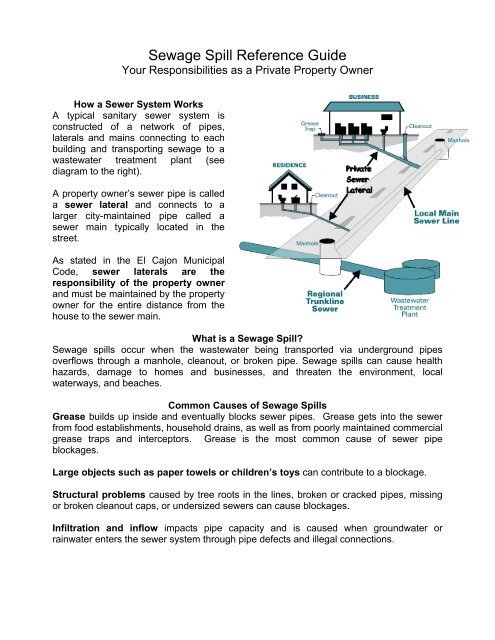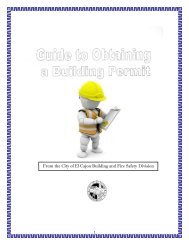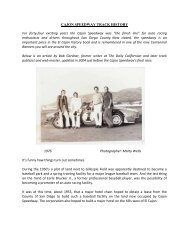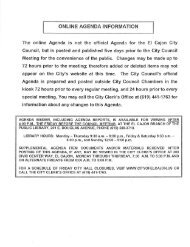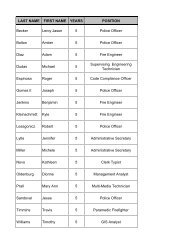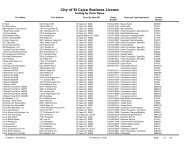Sewage Spill Reference Guide - City of El Cajon
Sewage Spill Reference Guide - City of El Cajon
Sewage Spill Reference Guide - City of El Cajon
Create successful ePaper yourself
Turn your PDF publications into a flip-book with our unique Google optimized e-Paper software.
<strong>Sewage</strong> <strong>Spill</strong> <strong>Reference</strong> <strong>Guide</strong><br />
Your Responsibilities as a Private Property Owner<br />
How a Sewer System Works<br />
A typical sanitary sewer system is<br />
constructed <strong>of</strong> a network <strong>of</strong> pipes,<br />
laterals and mains connecting to each<br />
building and transporting sewage to a<br />
wastewater treatment plant (see<br />
diagram to the right).<br />
A property owner’s sewer pipe is called<br />
a sewer lateral and connects to a<br />
larger city-maintained pipe called a<br />
sewer main typically located in the<br />
street.<br />
As stated in the <strong>El</strong> <strong>Cajon</strong> Municipal<br />
Code, sewer laterals are the<br />
responsibility <strong>of</strong> the property owner<br />
and must be maintained by the property<br />
owner for the entire distance from the<br />
house to the sewer main.<br />
What is a <strong>Sewage</strong> <strong>Spill</strong>?<br />
<strong>Sewage</strong> spills occur when the wastewater being transported via underground pipes<br />
overflows through a manhole, cleanout, or broken pipe. <strong>Sewage</strong> spills can cause health<br />
hazards, damage to homes and businesses, and threaten the environment, local<br />
waterways, and beaches.<br />
Common Causes <strong>of</strong> <strong>Sewage</strong> <strong>Spill</strong>s<br />
Grease builds up inside and eventually blocks sewer pipes. Grease gets into the sewer<br />
from food establishments, household drains, as well as from poorly maintained commercial<br />
grease traps and interceptors. Grease is the most common cause <strong>of</strong> sewer pipe<br />
blockages.<br />
Large objects such as paper towels or children’s toys can contribute to a blockage.<br />
Structural problems caused by tree roots in the lines, broken or cracked pipes, missing<br />
or broken cleanout caps, or undersized sewers can cause blockages.<br />
Infiltration and inflow impacts pipe capacity and is caused when groundwater or<br />
rainwater enters the sewer system through pipe defects and illegal connections.
You Are Responsible for a <strong>Sewage</strong> <strong>Spill</strong> Caused<br />
by a Blockage or Break in Your Sewer Lines!<br />
Time is <strong>of</strong> the essence in dealing with sewage spills. You are required to immediately:<br />
Control and minimize the spill. Keep spills contained on private property and out <strong>of</strong><br />
gutter, storm drains and public waterways by shutting <strong>of</strong>f or not using the water.<br />
Use sandbags, dirt or plastic sheeting to prevent sewage from entering the storm<br />
drain system.<br />
Clear the sewer blockage. Always wear gloves and wash your hands. It is<br />
recommended that a plumbing pr<strong>of</strong>essional be called for clearing blockages and<br />
making necessary repairs.<br />
Notify the <strong>El</strong> <strong>Cajon</strong> Department <strong>of</strong> Public Works by calling (619) 441-1653 during<br />
business hours, or call the Police Department Communications Center 24-hour number<br />
at (619) 579-3311.<br />
You May Be Liable<br />
Allowing sewage from your home, business or property to discharge to a gutter or storm<br />
drain may subject you to penalties and/or out-<strong>of</strong>-pocket costs to reimburse our city for<br />
clean-up efforts and enforcement actions.<br />
What To Look For<br />
<strong>Sewage</strong> spills can be a very noticeable gushing <strong>of</strong> water from a manhole or a slow water<br />
leak that may take time to be noticed. Investigate suspicious looking wet areas. Look for:<br />
Drain backups inside the building.<br />
Wet ground and water leaking around manhole lids on to your street.<br />
Leaking water from cleanouts or outside drains.<br />
Unusual strong <strong>of</strong>fensive odors from wet areas near sidewalks, external walls, or<br />
landscaped areas.<br />
Slow draining or clogged sinks and toilets<br />
Be Cautious<br />
Keep people and pets away form the affected area. Untreated sewage has high levels <strong>of</strong><br />
disease-causing viruses and bacteria.<br />
How You Can Prevent <strong>Sewage</strong> <strong>Spill</strong>s Before They Happen<br />
Never put grease down garbage disposals, drains or toilets.<br />
Perform periodic cleaning to eliminate grease, debris and roots in your house plumbing<br />
and sewer lateral.<br />
Repair any structural problems in your sewer system and eliminate any rainwater<br />
infiltration or inflow into your plumbing system.<br />
Do not dispose <strong>of</strong> paper towels, or other large objects in toilets.


